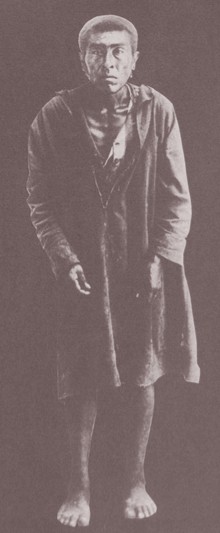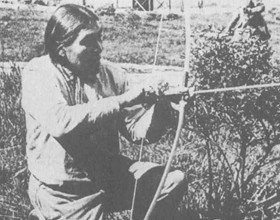|
(18?? – 1916)
Class
of 2007
Influence on the Sport
 "You
Stay, I Go" "You
Stay, I Go"
There he stood ... tearfully straddling two worlds,
bridging two cultures. For him there were three realities ...
yesterday, today, tomorrow. Looking back he saw life; his youth,
family, home, ... his world. Pondering the present he could only
feel confusion, emptiness, and grief. The future, as far as he
could imagine one, offered loneliness and fear; an unknown world
into which he must walk if he was to live. But he was to walk it
alone. There was no one by his side, no one to guide him, no one
to give comfort. They were all gone. He was the last of the Yahi.....
Imagine if you can, bearing the burden of grief that Ishi
bore. From the time he was a child, he witnessed the systematic
slaughter of his people. He lived his entire life in fear.
Always hiding, always running. He watched helplessly as his
friends and relatives were killed, lost, or died of hunger. He
struggled to survive while his world grew smaller and smaller.
His tiny circle of companions, his last connection to the Yahi
and their long tradition, disappeared. They dwindled away before
him and there was nothing he could do to stop it. Everything was
gone. His world had vanished and he had not one soul to turn to,
to talk to, to walk with. He was the only Yahi speaking person
alive in the world. No one else, they were all gone, but he ...
Ishi. He was the finale.
The last known survivor of a dying
tribe of Yana - or Yahi - Deer Creek Indians, Ishi is recognized
today as "Americas last primitive Indian
archer." No one will ever know the details of his early life;
however, at dawn of August 29th, 1911, the terror stricken
"Stone Age savage" was found cowering near the small
village
of Oroville, California.
Emaciated, exhausted, and on the brink of starvation, Ishi was
taken into custody and housed in the Oroville Jail where
authorities provided food and shelter. As word of his capture
spread, two professors of Anthropology at the
University of
California
- Alfred Kroeber and T.T. Waterman - traveled from San Francisco to study the Oroville "wild
man" and perhaps unravel the mystery of his ancestry. Only when
professor Waterman finally spoke a word of the "Yana
language was communication with Ishi established.
Eventually the professor's returned to
San Francisco accompanied by Ishi,
providing him with furnished living quarters in the university’s
museum. It was here that Ishi first met Dr. Saxton Pope, an
instructor at the California School of Medicine and the
physician who had been
 charged with monitoring
Ishi's physical
condition. What began as a purely professional relationship
quickly developed into a strong friendship. Soon Ishi was busy
teaching Dr. Pope and his close friend, Arthur Young, how to
knap obsidian arrowheads, make a bow and arrow (or sawa), how to
shoot them, and how to hunt Indian-style with these primitive
tools. charged with monitoring
Ishi's physical
condition. What began as a purely professional relationship
quickly developed into a strong friendship. Soon Ishi was busy
teaching Dr. Pope and his close friend, Arthur Young, how to
knap obsidian arrowheads, make a bow and arrow (or sawa), how to
shoot them, and how to hunt Indian-style with these primitive
tools.
By sharing the cultural secrets of how Yana
people lived and hunter, Ishi instilled in his new found white
friends a passion for pursuing wild game with the bow and arrow.
Together they stalked deer, bear, and small game in the north
central California
wilds along Deer Creek near
Mount
Lassen.
Ishi lived only five years after his capture in Oroville,
succumbing to pulmonary tuberculosis on March 25, 1916.
Despite the relatively short time Ishi spent with Saxton Pope
and Art Young, he left a lasting legacy that lived on in the
personal memories and published writings of the two noted
pioneer archers and bowhunters. Even today Ishi's influence
is left by all who follow the trail blazed by Pope and Young.
Ishi was in fact the singular most significant bridge to
modern bowhunting. His impact flowed from Pope and Young, and through,
Fred Bear and Glen St.Charles. He was the cornerstone in the
foundation of bowhunting as we know it today.
Notes of Interest:
-
Known as “The Last Primitive Indian Archer”
-
Only Survivor of the Yana or Yahi Deer
Creek Tribe; Captured 1911 in Oroville, California
-
Met Dr. Saxton Pope at the University of California
While Being Housed for Study; Shared His Bow and
Arrow-Building Skills
-
Hunted Deer, Bear, and Other Northern California Game
with Pope, Art Young, and “Chief” Compton, Teaching His
Friends Ancient Stalking and Shooting Methods
-
Sparked Interest in Bowhunting That Spread Nationwide
Through Pope’s Books and Magazine Articles
-
The Ishi Award Is the Pope and Young Club’s Highest
Award
|